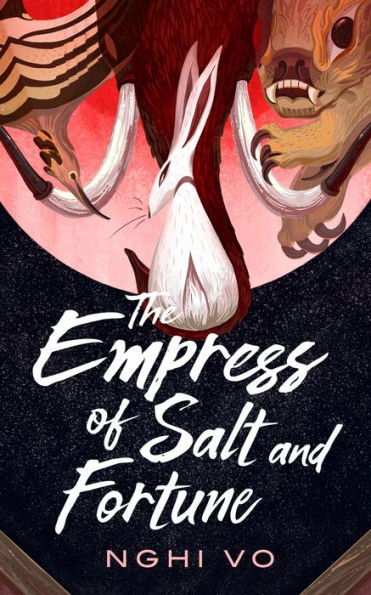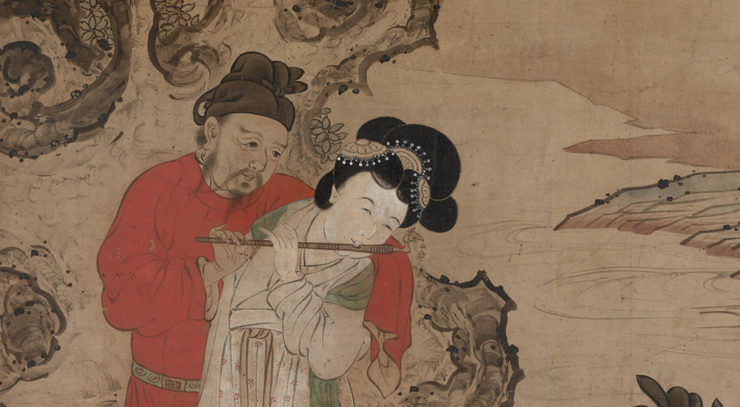So let’s talk about monarchy, or, because I’m not a historian but a storyteller, let’s talk about the stories we tell about monarchy, or, because I want to tell a story, let’s talk about Consort Yang.
In 733, Yang Yuhuan at the age of fourteen was married to Li Mao, the crown prince of the Tang dynasty in China. Some five years later, the emperor, Li Mao’s father, moved to make Yang Yuhuan his instead. He made her a nun to dissolve her marriage, and then he claimed her as his consort, granting her the title guifei, the highest rank to which a consort could ascend.
We know—we think we know—that Emperor Xuanzong loved her. He showered riches on her family, he made her relatives his councilors, and he used the imperial courier system to fetch lychee from Guangdong, her favorite fruit. He started to ignore his duties in favor of spending time with her.
Consort Yang, beloved, sheltered, and treasured, became a symbol of everything that was wrong with the empire by 756. General An Lushan claimed the northern half of the country for himself, leading to a conflict that would claim as many as 13 million lives, or roughly a sixth of the world’s population at the time. That lychee story did not travel well among people who had already lost too much.
When Emperor Xuanzong fled from the capital at Chang’an for Chengdu, the imperial guard killed Consort Yang’s relatives and then demanded her death as well. The emperor refused at first, but when the army threatened to mutiny, he was convinced to order Consort Yang’s death by strangulation.
That’s a place to start. It satisfies, somewhat. We like stories about love and tragedy, and when you set them in the halls of royalty, they’re all magnified, given a resonance they would never have. Suddenly things that may be sordid or unpleasant are gilded by history and softened by nostalgia. Consort Yang does not exist for us as a woman from the Shu Prefecture. Instead she exists as an object of desire, an object of love, and eventually as the target of a vast national fury. There was a person there once, but contact with the emperor and the machinations of royal intrigue changed her into something else.
While she lived, there were many stories told about Consort Yang, plenty jealous, many venomous, and eventually, they became dangerous. Consort Yang is an evil, silly woman who seduced Emperor Xuanzong into forgetting his responsibilities to his country. With her wicked favors, she enriches her family beyond all reason. She causes the emperor to ignore the rising threat of the An Lushan Rebellion, and it is not until she is executed that her spell over him is broken.
Some stories are fatal.
Some fifty years after Consort Yang was strangled to death by a royal eunuch, the famous Chinese poet Bai Juyi writes Cháng Hèn Gē, or Song of Everlasting Regret. He talks about how the beautiful girl and the emperor fell in love and how she died (“Her ornate headdress fell to the ground, and nobody picked it up”). The emperor mourned her so long a Daoist priest ascended to find her and to tell her the emperor loved her still. Song of Everlasting Regret is considered a masterpiece of Chinese literature. It’s been set to music, illustrated, translated countless times. It’s beautiful, just like she was meant to have been.
This is romance, pure and simple. It’s great, it’s grand, and it’s remembered. The love softens the edges of execution, and the mourning of an emperor is so great it breaches the line between life and death. It’s a great story, a glamorous one, and one that has affected generations. Still it doesn’t do Consort Yang herself much good.
Two hundred years after Consort Yang is dead and gone, Murasaki Shikibu writes Genji Monogatari, or The Tale of Genji. It’s the world’s first novel. It’s all about the affairs of the Shining Prince and the love, duty, disgrace, and standard supernatural happenings that made life at the Heian court what it was. Lady Kiritsubo, a beautiful woman who rose from a low station only to be persecuted by cruel courtiers, is a direct literary descendant of Consort Yang. Lady Kiritsubo wastes away, an untimely end, but it’s a better fate than being strangled on the road between Chang’an and Chengdu.
Six hundred years after that, there’s a Tokugawa-era story where Consort Yang is rescued from her fate and brought to Kuzu, where she lives for a short while before she dies. Various regions in Japan claim to be the refuge of Consort Yang. She gains another kind of life in Japanese stories, poetry and art, reborn and happier if the stories are to be believed. She helps stop a rebellion, she halts a plague. It’s better than dying.
It’s early in the 2000s, and I’m sitting in a lecture hall at the University of Illinois. I’m taking notes, I’m drawing in the margins of my notebooks. I write down the words Yang Guifei.
Almost twenty years after that, I can’t remember if I was in a history class or a literature class, and I’m both appalled by that fact and struck with its rightness. More than a thousand years after Consort Yang’s demise, it feels like the worst kind of arrogance to think we’re going to get any kind of truth from it or that we get to make some kind of judgment. What we’ve got left are the stories, and if we’re lucky and compassionate and clever, maybe we can feel the shape of the truth in the negative space around them.
Buy the Book


The Empress of Salt and Fortune
The story of Consort Yang is one that’s wrapped around monarchy and power, and at the center of it is a woman who lived more than a thousand years ago. She has been a temptress, a scapegoat, the romance of an era, a historical curiosity, and the subject of countless pieces of art. Dozens of actresses have brought her to life on the stage and screen, and they say words she never said with mouths that are living while hers is filled with the summer dust of the road from Chang’an.
When we look at the story of Consort Yang, we’re looking at something that has taken on a life of its own, something I always found unfair given that Consort Yang had hers taken away from her. It’s good to give voice to the voiceless, but it’s also too easy to let our own voices speak through long-dead, long-silenced mouths as well.
That’s power, and it runs straight through all of these stories. It’s power to pull her from her first marriage and make her a consort, it’s power to use the story of her rise to whip an army into rebellion, and it’s power to turn her into a tragic love story that resonates for a thousand years. She’s not royal herself, but every step of the way, she’s glamorized, victimized, lionized, and convicted by her association with royalty.
It’s also power to give her a softer and a better ending, and to allow her to live on in other stories. (Maybe it’s compassion or empathy or sympathy, too. It depends). It’s power and privilege to be living a thousand years later and to listen to her story in an elective class half a world away. It’s a power that was never given to her, and with every rendition of her story I gave you above, I’m uneasily aware that somewhere, hidden in the far depths of history, is a woman who might have lived a longer, better and kinder life if she had never been run over monarchy and the stories we tell about them.
Monarchy is too big to look at. Too many emperors, too many centuries, too much pain weighed against too many moments of redemption. This is another place where we have to find the truth in the negative space, by looking at the ways the emperors and empresses warped the stories around them.
We probably wouldn’t know Consort Yang’s name at all if she hadn’t been loved by an emperor teetering on the brink of disaster. As it is, we still don’t know so very much. All I know is that she’s dead, and all I know about death is that we are dead a long, long time.
Nghi Vo was born in central Illinois, and she retains a healthy respect of and love for corn mazes, scarecrows, and fifty-year floods. These days, she lives on the shores of Lake Michigan, which is less a lake than an inland sea that she is sure is just biding its time. Her short fiction has appeared in Strange Horizons, Uncanny Magazine, PodCastle, Lightspeed, and Fireside. Her short story, “Neither Witch nor Fairy” made the 2014 Tiptree Award Honor List. Nghi mostly writes about food, death, and family, but sometimes detours into blood, love, and rhetoric. She believes in the ritual of lipstick, the power of stories, and the right to change your mind.










